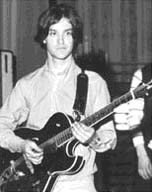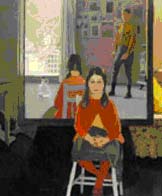The Kinks Face To Face with 1966:
Where Have All the Good Times Gone?

by Michael Baker
(April 2004)
"Hold it—that don't move me; let's get real real gone for a change."
Elvis Presley, during Sun session of "Milkcow Boogie Blues"
Just considering the singles of 1966 catapults that year into Top 25 consideration of the American Culture hierarchy. Anyone out there read a novel from 1826 lately? Let me save you the time. Do not. Ever. The singles' bold audacities were driven by a burgeoning garage scene, Motown's attention to consistency, and Stax's high standard of excellence, and the year's subsequent slices of poetic angst, miniature rebellion, feminine defiance, becoming such standards as "96 Tears," "Don't Mess With Bill," and "B-A-B-Y." The year, however, is best recalled as the year of the long playing suite: immediately before James Brown's declarations of funk, the Summer of Love, Tet, and everyone being high, 1966 brought notable efforts from the east, west, north, and south: Fred Neil; two each by the Hollies, Animals, Herman's Hermits, Four Tops, and Wilson Pickett; Mayall and Clapton; Getting' Ready and Sunshine Superman; Sounds of Silence and Parsley, Sage; the remarkable Dedicated To You, by the Manhattans; the Kinks' Kontroversy; live Ochs; and memorable albums from Dusty, the Turtles, Manfred Mann, The Action, Shadows of the Knights, and the Everlies. And in a special category of What-Were-the-Musicians-Doing-Without-Cocaine-Department: six by James Brown, four by the Righteous Brothers, and three by Our Dear Departed Brother, Marvin. Vietnam was on the second page, the KKK, the nineteenth, transistors were blaring, and sisters named Laura and Lynn were frugging in their twisting, tiny bikinis. It was a year of glistening miracles, an anus mirabilis, as Joyce would say. We have not, moreover, even neared the top shelf.
Reagan became a governor that year, starting a dumbing down of America and lasting vividly through this cold morning as I write, unparalleled in duration or intensity, besting easily the intellectual torpor and fiscally fiduciary malfeasance of the Coolidge-Harding sleepover. In 1966, Walt Disney thankfully died, but not quite in time to stop his watered-down vision's spread; Buster Keaton and Lenny Bruce both bit it, but their funny moments were by then distant druggy dreams. Uncomplicated, contrarily, and in perfect pitch with hope and liberty and virtually free tuition, was the pop music. If I were sober, or savvy, I would name 1966 as the Year of the Debut. What were fans doing when they monthly went into the new mall's new record store and heard this shit for the first time: the Young Rascals; Zappa's Freak Out; Jefferson Airplane; Mama and the Papas; the Small Faces; The Monkees; Cream; Love; the Monks; Tim Buckley; 13th Floor Elevators; Tim Hardin. This is rock and roll made simply, bursting with baroque and brash ideas, keening and self-centered, vigorously and impudently shedding echoes of bland Doo Wop, monochromatic skiffling, mild crooning, bleached-out Berryisms, or Phil Spector inhuman lushness. This music mattered and challenged, existentially engaging the lucky listening minority who paraded in neither swimming suit nor tall hair. Motown kept soaring, towards racial harmony; Stax kept getting grittier, pleadin' for chitlin and booty and one steady, sturdy man; teenagers in Texas went into ramshackle studios with music dancing in their heads from Bo Diddley or the Yardbirds and turned the borrowed amps way up. Way up. This music did not lie to or shortchange or diminish the attentive consumer. 1966 was before codification, corporate dominance, or capitulation of independent artistic impulse. Using words like 'innocence' or 'naiveté' and 'hope' is insulting; spent much time in Detroit that year? But if a musical year could ever be described as simultaneously a great hybrid of influences and a time of emotional and musical experimentation it was then: if it felt good, bang it. And harder.
Yet, the Top Ten Albums of 1966 have not even been hinted at, making this the greatest year in rock history. Redding's Otis Blue tore at you, and then knocked you down, leaving you there; Butterfield's East-West introduced bluesy psychedelia, raga, jamming, and sick licks of Jewish misery from Michael Bloomfield's bottomless heart. The Byrds' Fifth Dimension, the Yardbirds' Roger the Engineer, and the Who's Happy Jack were the climaxes of those groups up to that point—startling leaps over their prior works, full of energy and confidence and bravado and wit and technique. The Stones released the first of their five masterpieces soon stretched over time and space, the alcoholic Aftermath, and their winsome, fracturing rivals put out their best, Revolver. The Beach Boys went to heaven in drag cars with blondes and came back with shorter hair and the nearly-perfect Pet Sounds. And Dylan, before zigging instead of zagging over Woodstock alleys, stole some session cats for a few days, drank some cheap red wine, swallowed bits of Ginsberg, and made the hallucinatory gorgeous Blonde on Blonde; taking his "Mystery Train"-like leap to England, "Traitor!" our former British cousins howled, but if I had any friends this would be the Dylan, the album, the idea, that they would take to their desert island graves. But the best album of that year was Face to Face, by the incomparable Kinks.

... make my muse a mouse for the young prince to toss,
Like one the cat pretends to be free."
Marianne Moore
The beginning is also an ending: Sleepy John Estes' "Milk Cow Blues," later re-vamped by Koko Arnold, then Elvis, is the last blatant and half-baked Kinks stealing, borrowing, and imitating of American blues. Brother Dave, still a teenager, cries, "Well I've tried everything to get along with you," and, well, not really. No one in the Kinks ever bothered to be friendly, and here in Kontroversy, the band discovers the protective company of each other, with songs cohering around themes that would obsess leader Ray: disappointment; grayness of life; miscommunication; entropy; and general distrust and distaste for large things: governments, popular culture, and statements of abstract belief. There is much, however, to keep Ray standing straight up and even smiling—love and home are actually stressed in non-ironic pleadings. The music is not melancholic for the most part; still unmindful of potential studio sophistication—this is a true Shel Talmy production—and more content to re-tread the slashing, falling down guitar leads of their prior classic singles, the songs breathe deeply of their era. Folk rock and Mersey strains are given serious attention, as are Yardbirds-like rave ups and Stonesy raunchers. Faux country is even hinted at on "I Am Free," and tribal harmonica is not so much played as gangbanged on "Gotta Get the First Plane Home." Some of the guitar breaks rock hard, clever pastiches culled from surrounding British blowings in the wind. In the middle of the album is the urgent "Till The End O The Day," a great burst of energy that features Dave's stuttering 15-second break, halting in structure, but defiant in tone. By this time, Ray trusts the drummer more, and the background singing, never quite harmonious, is more like the Band's later participatory democracy of singing about lost times, empty bottles, and backbreaking tours. The song, a doppelganger of "All Day and All of the Night," has a bright Who-like Mod intensity, spawning bands like the Creation, and later the Jam; the rhythm section, in a trademark countering sludge, slows things to a crawl, sounding like the early Move. In other words, the Kinks are a British Band.
The album is sloppy at times, but in 1966 Ray becomes an artist: although he on his ballads, he adopts a type of crying of the melody like Estes, it does not need the cover here, nor the bland "What's In Store For Me." Using Dave more as a singer, (lead, in unison, and background), has given the music more depth, as has the more polished drumming. The transformative spirit of the album, both for the band and music in England, is the sassy pursuit of limitless freedom. Progress is possible, love is at home, and young men live skinny forever. Ray defines hope, liberty, and potential for the individual: "Shout out, ring the bells/Shout out, tell the world I'm in love/Ring out, I feel fine," and later "Doors are open wide/No credits to be seen/Sail with me my friend." Friendship, the uselessness of worrying "'bout the sun," and those leggy girls, make us free to equally enjoy the exercising of liberty.
Sour notes indeed creep in near the end, marring the mood, and prepping for the band's lyrical future: "It's Too Late," "What's in Store For Me," and the finale, "You Can't Win" are somber notes, but not declarations, more puppy doggish. The questioning mood was prompted by Kontroversy's ninth song, the album's masterpiece, "Where Have All The Good Times Gone." Ray and Dave, cumulatively barely forty, lament the easier days, filled with games, clear boundaries, and consistent parental love. Nine times they ask about the location of the free times. It is "we" this, and ma and pa that, making it not only a plaintive plea for advancing anxiety, but a sharper characterization of individuals, a trait that becomes the métier of Face to Face. Ray understands that the earlier simplistic declarations of liberty come at a price: equality leads to arbitrariness; individuals become collections wearing uniforms; the youth fall in the street, and try to sleep off their insanity.

I who first saw the light bred out of a match/accursed, and accursed in my living..."
Oedipus, Oedipus the King
First off, the music has diversity and certainty, experimentation and chops—dance hall easygoingness; cabaret wistfulness; powerful autobiographical ballads; folksy instrumentation, seen through the eyes of ravers and neo-mods. The studio is used well for the first time, and the backup singing, the overdubbed acoustic guitars, the sound effects, and the perfect balance achieved between the music and singing all attest to maturity and musicians on a mission. No sloppy blues here, no Bonzo Dog Band-like instrumental meltdowns: the parts equal the sum achievement, and nary a note, word, or savage snare snap are wasted.
The album starts with a joke, a sound effect, a series of increasingly-desperate questions, and a sense of humor, and also like most first marriages, it ends with further queries, followed by mornings of isolation and sadness and defeat. "Party Line," and the next two songs, ""Rosie Won't You Please Come Home" (a Davies sister) and "Dandy," underscore Ray's sense of satiric portraiture; these citizens don't vote, are alone, repeat beginnings, leave home; they go up or down—both directions are disastrous —in British society. They are sisters who don't write, nameless intruders, and minor Lotharios, poseurs superficial and seeking and entropic. The next song signals a shift in the Kinks: beautiful harmonies, integrated musicianship, confessional poetry of the saddest order, and a ballad that brings me to my knees: (There's) "Too Much on My Mind," "ruining" things, making the singer "demented." It's clear by now that the songs are intertwined, but not so much as operatically, but rather as a song cycle, a collection of dramatic motifs; unlike the Pretty Things' SF Sorrow or the Who's Tommy, the music is not operatic, propulsive, and re-iterated. The songs don't so much as resemble each other as feed off one another. What is repeated is a young man's scorn for social climbers and bureaucratic uniformity, and a seeming old man's lament for lost characters daily fighting their descent. The Kinks portray their empty royal universe and tease the grey institutions manned by pub crawlers, Miss Lonely-hearts, and haters of change.
The point to be stressed is this. The Kinks have become world-class singers and players. The vocals, exuberant, screaming, wistful, mocking, and sober (is often) when soloing, needy, reedy, sometimes nearly breaking down under the emotions' strain, but moving easily and slightly behind the rhythm guitar. The steadfast bass playing is Entwhistle-like, the drumming, splish splashy, and sloppy, but never retarding the movement. The star, of course, is the unique, eccentric, autocratic Dave on lead: as the driving soloist, versus the ensemble's daily plunge into greater maturity, he takes all the chances, giving the songs their richness and variegation. He has no chaste lines, no poppy self-consciousness: his guitar writhes, playing top heavy and often sinister forms. If Ray's lyrics taunt the middle class and their misplaced priorities and illusions and silly ancestors and their silly walks, Dave is contrarily blue collar: his guitar is so rooted in time and place that every solo is a statue to a once great empire.
Ray demystifies freedom here: against the music's heretical phrasing, spacious antidotes to contemporary pop, Ray non-sentimentally rejects rationality and embraces life's absurdities. He delights, instructs, whines, and is often "too terrified to cry." The sense of boundless possibilities is now making sure your pint is half filled. The "session man" is not paid to think; there is "no hope, no reasoning;" the smug owners of a house in the country have daddies too drunk to navigate simple stairs; commercialized Hawaii is a Tower of Babylon; the people overreach their economic and imaginative universes, ending up dancing with the forgetful Miss Queen of Darkness, missing carefree times. Liberty and equality are not a right, but rather accidents. In exchange of this world, Ray has to surrender all fantasies. You are rich, said Henry James in Portrait of a Lady, when you are free to meet the demands of your imagination. On Face to Face, we lack inspiration. Although we may congratulate ourselves on not fighting in the streets, or for buying the finest Honda, we still pay homage to faceless potentates.
The Church, in Ray's home of Muswell Hill, used to instruct, educate, guide: the primary source of information for voting, economic, and moral issues, the sermon was the formalized pre-media centerpiece of the village. Controlling emotions, it told people what to do. Reverend, I mean Rabbi—sorry, Mom—Ray became that voice in the late 60's. Free of cant and Biblical allusions, Ray's lyrics nonetheless hearken back to his more saintly and conscientious forefathers. Here Ray fingerpointedly accuses, teases, and pleads with his contemporary congregation- we who wanted a "life of luxury," but got the daily fading sun. This faded glory and Ray's warnings are felt most bittersweetly and poignantly in the album's penultimate song, the masterwork, "Sunny Afternoon." The diction, like the imagery and the melody, counters the "tales of drunkenness and cruelty" notes of sadness. The words are funny, wicked, and ironic: welcome to my world, but I'm not waving, I'm drowning. The background crooning and killer dance hall Nicky Hopkins keyboards belie the sadness of the scenario. The song begins, of course, at another Kinks (dead) ending: "The tax man's taken all my dough/ And left me in my stately home/…He's taken everything I've got /All I've got's this sunny afternoon." The last song sings eleven times non-mockingly that Ray will "remember everything," and so it goes here—squeezing fat mamas, the unquestioning life, the refusal to probe the world, and dumb and idiotic landscapes peopled only with solitudes and the broke, broken.
These are non-sympathetic portraits. These are songs of cleverness and challenge and imagination. It's easy to knock the Kinks for their lack of humanity, their superior stances of coolly detached poise, but I see, feel, and hear voices sharing the social sadness, for the most part, equals in a world so divided by cheapness, corruption, and mere lip service to political conviction. Also, for the most part, the majority of Ray's insights lack shock or condemnation. He does not care where your yacht was docked, or how many hours you watch the telly. He does not rectify wrongs, nor does he contemptuously hold court, issuing fiats of sarcastic cartoonish bromides. We are all shitty sods, sorry lumps of fearfulness eagerly awaiting the new Lite product, the faster Internet service to Swedish porn. We are all also face to face, but unwilling to trace our fingers over each others' scars.